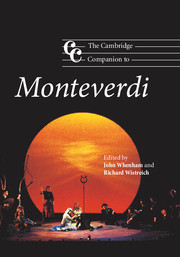Book contents
- Frontmatter
- Dedication
- Contents
- List of illustrations
- Notes on contributors
- Preface
- Chronology
- 1 Approaching Monteverdi: his cultures and ours
- 2 Musical sources
- 3 A model musical education: Monteverdi's early works
- INTERMEDIO I ‘Ecco mormorar l'onde’ (1590)
- 4 Monteverdi at Mantua, 1590–1612
- 5 Spaces for music in late Renaissance Mantua
- 6 The Mantuan madrigals and Scherzi musicali
- INTERMEDIO II ‘Ahi, come a un vago sol cortese giro’ (1605)
- 7 Orfeo (1607)
- 8 The Mantuan sacred music
- INTERMEDIO III ‘Laetatus sum’ (1610)
- 9 Music in Monteverdi's Venice
- 10 The Venetian secular music
- INTERMEDIO IV Lamento della ninfa (1638)
- 11 The Venetian sacred music
- INTERMEDIO V Magnificat SV281 (1641)
- 12 Monteverdi's late operas
- INTERMEDIO VI Il ritorno d'Ulisse (1640), Act V, scene 10
- 13 Monteverdi studies and ‘new’ musicologies
- 14 Monteverdi in performance
- Notes
- Bibliography
- Selected discography
- The works of Monteverdi: catalogue and index
- Index of titles and first lines
- Index of names and subjects
7 - Orfeo (1607)
Published online by Cambridge University Press: 28 September 2011
- Frontmatter
- Dedication
- Contents
- List of illustrations
- Notes on contributors
- Preface
- Chronology
- 1 Approaching Monteverdi: his cultures and ours
- 2 Musical sources
- 3 A model musical education: Monteverdi's early works
- INTERMEDIO I ‘Ecco mormorar l'onde’ (1590)
- 4 Monteverdi at Mantua, 1590–1612
- 5 Spaces for music in late Renaissance Mantua
- 6 The Mantuan madrigals and Scherzi musicali
- INTERMEDIO II ‘Ahi, come a un vago sol cortese giro’ (1605)
- 7 Orfeo (1607)
- 8 The Mantuan sacred music
- INTERMEDIO III ‘Laetatus sum’ (1610)
- 9 Music in Monteverdi's Venice
- 10 The Venetian secular music
- INTERMEDIO IV Lamento della ninfa (1638)
- 11 The Venetian sacred music
- INTERMEDIO V Magnificat SV281 (1641)
- 12 Monteverdi's late operas
- INTERMEDIO VI Il ritorno d'Ulisse (1640), Act V, scene 10
- 13 Monteverdi studies and ‘new’ musicologies
- 14 Monteverdi in performance
- Notes
- Bibliography
- Selected discography
- The works of Monteverdi: catalogue and index
- Index of titles and first lines
- Index of names and subjects
Summary
The myth of early opera
Early opera is often regarded as a completely new genre, created ex nihilo by a small circle of theorists and musicians in Florence and Rome as a conscious attempt to reinvent Ancient Greek tragedy which, some believed in the later sixteenth century, was sung throughout. Although this view has been justifiably criticised on a number of occasions, it still tends to be the prevalent model for the rise of opera even in recent encyclopaedias and textbooks.
However, none of the dramatic pieces which were, or may have been, performed musically in their entirety between 1590 and 1608 in Florence, Rome and Mantua, can be regarded as a tragedy in the Aristotelian sense because of their choice of subject, place and characters. Instead of depicting the tragic entanglements of kings and their like, situated in palaces or other appropriately courtly surroundings, early operas are generally set outdoors in country settings and are concerned with the loves of gods, semi-gods, shepherds and nymphs. In this respect they belong instead to the contemporary tradition of the pastoral play, a dramatic genre that evolved only in early modern times, even though it referred to the long-standing, but non-dramatic bucolic tradition of Greek and Roman classical authors. The most influential contemporary examples of this new type of pastoral play in Italy were Torquato Tasso's Aminta and Giovanni Battista Guarini's Il pastor fido.
- Type
- Chapter
- Information
- The Cambridge Companion to Monteverdi , pp. 119 - 140Publisher: Cambridge University PressPrint publication year: 2007
- 2
- Cited by



